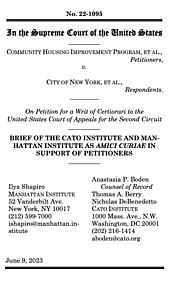Learn more about Cato’s Amicus Briefs Program.
New York City has maintained a system of rent control since the 1940s. Property owners in the City are subject to a thicket of regulations that affect their ability to rent and limit their right to exclude—arguably the most fundamental right in the “bundle” of property rights. The cornerstone of the City’s rent control regime is the Rent Stabilization Law, or RSL, which was enacted in 1969 and has been amended on multiple occasions—most recently in June 2019. The RSL has been the subject of several lawsuits throughout the decades.
There are approximately one million units under the purview of the RSL, comprising half of all New York City apartments. The RSL authorizes a government board to set annual maximum rent increases for stabilized units. This board is required to consider tenants’ ability to pay as one factor in setting rents, alongside owners’ costs and housing affordability.
The RSL severely limits property owners’ rights to occupy, use, change the use of, and dispose of their property. The RSL requires owners to renew tenants’ leases in perpetuity with very few exceptions, and those exceptions are entirely within the tenants’ control. Additionally, these renewal rights may be passed on to any member of a tenant’s family who has lived in the tenant’s apartment for two years.
Once a tenant occupies a stabilized unit, an owner may not retake possession of the apartment for personal use. Only upon a demonstration of “immediate and compelling necessity” may an owner reclaim just one of his or her units. And buildings held in the name of a corporate entity have no personal use allowance at all.
The RSL also severely restricts owners’ rights regarding the buildings themselves. Owners may not withdraw their buildings from residential use, change their units to commercial rentals or cooperatives, leave their property vacant, or demolish their property.
A not-for-profit trade association representing many New York City apartment building owners sued to challenge the RSL in federal court, but the Second Circuit upheld the law. Now the owners are petitioning the Supreme Court to take their case. Cato, joined by the Manhattan Institute, has filed an amicus brief supporting that petition.
Our brief makes three key points. First, the Supreme Court’s recent opinion in Cedar Point Nursery v. Hassid (2021) casts serious doubt on the constitutionality of the RSL, since the City has appropriated building owners’ right to exclude and granted that right to third parties. All of the Supreme Court’s precedents addressing the constitutionality of rent-control statutes long predate the per se rule for physical takings articulated in Cedar Point, which calls for those precedents to be reexamined.
Second, there is already a circuit split between the Eighth and Second Circuits over whether property owners can allege that rent control effects a per se taking under Cedar Point. We argue that the Eighth Circuit correctly followed the Supreme Court when it held that a per se takings claim could proceed against an eviction moratorium, while the Second Circuit erred here in denying plaintiffs’ claim against New York City.
Finally, we argue that the Supreme Court should take this opportunity to reaffirm the foundational takings principle that government cannot require a subset of society to privately incur costs that should rightfully be borne by society as a whole. The RSL impermissibly imposes societal costs on property owners alone when it forces them to charge lower rental rates based on tenants’ ability to pay. For all these reasons, the Supreme Court should take the case and ultimately reverse the Second Circuit.

This work is licensed under a Creative Commons Attribution-NonCommercial-ShareAlike 4.0 International License.


